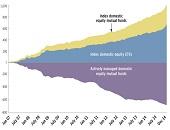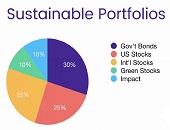The future of active management
“Active portfolio management is futile,” say some who watch the progression of the financial industry. “Active managers only randomly outperform the stock market as a whole.” Is this true, or have the rumours of its demise been greatly exaggerated? On June 10, 2021, Philip Young, CFA, welcomed a webinar audience on behalf of the CFA Society of Toronto to consider this very question as they listened to Ronald Kahn, Managing Director, and Global Head of Systematic Equity Research at Blackrock, the world’s largest asset manager. He recently co-authored the book Advances in Active Portfolio Management: New Developments in Quantitative Investing. […]
Who’s Minding the Bots?
Artificial intelligence (AI) is being implemented in nearly all sectors of the economy at an increasing rate. A 2019 survey by Gartner showed that 37 percent of organizations had already implemented AI in some form. When it comes to integrating AI into your company, what are the risks? What are the opportunities? On March 12, 2021, the Industry Relations and Corporate Governance Committee of the CFA Society Toronto convened a panel of experts to look at how effectively a company’s corporate governance can provide proper oversight and avoid mistakes. In other words, “who and how we will mind the bots.” […]
From Ideas to Action
Climate change will reshape how financial organizations and investors think about climate-related events. But how will we deal with climate change risk? How will financial organizations respond to increasing demands for transparency, measurement, and action? On February 2, 2021, the Institutional Asset Management Committee of the CFA Society of Toronto convened a webinar with three seasoned experts who discussed how best to move into a world of green initiatives. The session was opened by Brandon Gill, Senior Portfolio Manager, Capital Markets Group, External Public Investments and Credit at OPTrust, the pension trust fund of the Ontario Public Service Employees Union. […]
ESG disclosures: apples vs oranges
When it comes to environmental, social, and governance (ESG) funds, do you feel like we are still comparing apples with oranges? Isn’t it time for a global voluntary standard? “There’s been an explosion of interest in ESG investing, but the inconsistency in ESG-related disclosures could lead to an erosion of trust in the industry,” said Deborah Kidd, who is a director with the Global Industry Standards (GIPS). She was the first of two panelists who presented a consultation paper on “ESG Disclosure Standards for Investment Products” at a webinar titled “Improving Transparency and Comparability of Investment Products with ESG-related Features” […]
Investing in the greater good
Every day, more investors are converting their portfolios to socially responsible investing (SRI). But does being a socially responsible investor mean you will take a hit on performance? “Over the last five years, responsible investments have done at least as well as the traditional portfolio,” said Tim Nash, a fee-for-service financial planner who spoke at the webinar “Investing in the Greater Good” on August 18, 2020, sponsored by Questrade. Nash is the founder of Good Investing and blogs as The Sustainable Economist. He is also the lead researcher for Ethical Markets Green Transition Scoreboard research report, which details more than […]
Healthy skepticism
Selecting environmental, social, and governance (ESG) funds is a way that ordinary citizens can invest in an ethical way. But what does the increased interest in ESG investing shown by institutional and private wealth clients really mean? Is it paying off? Are we at a watershed moment for structural change in the way investors allocate resources? The move to consider ESG investing came some years ago with scandals such as Enron, and continues with more scandals such as Volkswagen’s Dieselgate and Facebook’s meddlings, said Pedro Matos, a professor of finance at University of Virginia and the author of the CFA […]
Quality in the time of Covid
There’s a wide range of “quality factor” investing out there. How can the investor distinguish between the variety of methods? More importantly, how can the investor select the best factor method for given economic conditions? To answer this question, a recent paper compared the variety of methods, and examined how each method performed under different market conditions. The paper, “What is Quality?”, by Jason Hsu, Vitali Kalesnik, and Engin Kose, won the Graham & Dodd 2020 award for the best paper published in the Financial Analysts Journal in 2019. To celebrate the achievement, the journal invited the authors of the […]
Private Equity in “the new normal”
From pandemic to protectionism, global events and trends are having an impact on the private equity (PE) markets. From a Canadian perspective, what effect are these issues having on the alignment between PE investors and PE fund managers? In Toronto on July 9, 2020, Helen Pham welcomed three panellists to the webinar titled, “Private Market Trends: Improving Alignment Between Investors and Managers.” The webinar was organized by the institutional asset management committee of the CFA Society Toronto. The panellists shared their thoughts on how investors should view effects of the global pandemic on private equity markets and the associated risks […]
Top 5 Trends in Risk Management
The champagne has been drunk, and the New Year has been rung in. What trends are predicted in risk management as we welcome the new decade? “In 2020, we’ll likely see significant changes in risk models, processes and functions,” predicts Brenda Boultwood, Risk Advisory Partner at Deloitte. As a senior expert in risk culture and corporate governance, she published an article online January 10, 2020, for the Global Association of Risk Professionals (GARP). We present the highlights and a link to the full article below. The three lines of defense business model, as we know it, will end This is actually […]
Machine learning sniffs out corruption
“Bribery and corruption are by-products of risk culture,” said Aparna Gupta, Associate Professor at Lally School of Management at Rensselaer Polytechnic Institute. “We can take a step back and devise methods to detect it using textual data and machine learning.” Gupta was the second of two speakers at the one-hour webinar “Corruption and Corporate Governance” sponsored by the Global Association of Risk Professionals (GARP) on October 30, 2019. Since culture is intangible, empirical work on the relation between risk culture and risk management is limited. Traditional approaches for assessing risk culture have many drawbacks such as bias and lack of comparability. Nonetheless, […]










